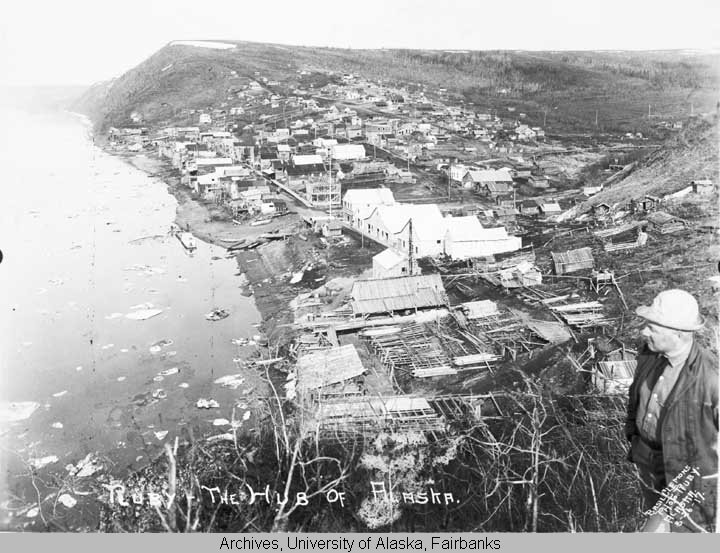
Note: This page and it's links have moved to: http://rubyalaska.info/.
This page is no longer being updated at this location. Please change your bookmarks.
|
|
RUBYAn Alaska Gold Rush Town On The Yukon RiverIn 1906 gold was discovered on Ruby creek which brought more prospectors to the area. When word leaked out in 1910 about the discovery of gold on Long Creek, some 30 miles south of Ruby, it sparked a new gold rush. In 1912 gold was found on Poorman Creek, in 1914 on Swift Creek and in 1920 on Moose Creek. Ruby became the supply center for mines in the area. Total gold production for the Ruby area through 1960 was about 390,000 fine ounces. Today Barry Clay works the same Swift Creek Mine his grandfather did in 1915. In 2005 it was the only permitted mine operating in the Long - Poorman area. Compare Ruby then (1917) and now (2006) with side by side pictures. Ruby Residents1907 to WW2 Business in Ruby's early days Community overview Early Fraternal Organizations, Churches and Schools Placer deposits map of the Ruby mining district The city of Ruby was founded in January of 1912 and incorporated January 13, 1913. The name was actually a mistake as the early miners thought the red rocks found in the stream were Rubies. In it's early days Ruby was sometimes called, "The Hub of Alaska" for it's location in the near geographical center of the state. Another nickname for Ruby was "The Gem of the Yukon." Ruby had electric lights, telephone, stores, outfitters, two newspapers, post office, two lumber mills, scheduled barge and riverboat service. At it's peak Ruby had a population close to 3,000. For a few years Ruby rivaled Fairbanks as the center of civilization on the Yukon River. The following pictures are owned by Alaska Digital Archives. See many more pictures of early Ruby and Alaska on their web site. |
 |
| 1912, 1st Ave in Ruby. Note the
electric street lights. Except for the dirt streets it was quite a modern
town in it's day. |
 |
| In 1911 there were still many tents
but Ruby was seeing a building boom. The barge anchored near shore was
the Northern Commercial Co. store until early in 1912. |
 |
By 1917 Ruby had seen a lot of development.
The huge light colored building in the lower middle of the photo is the
Northern Commercial CO. store and warehouses. Below that, near the water,
is Simon's sawmill one of two in Ruby. |
Copyright © 2006-2025 W.D. Larson